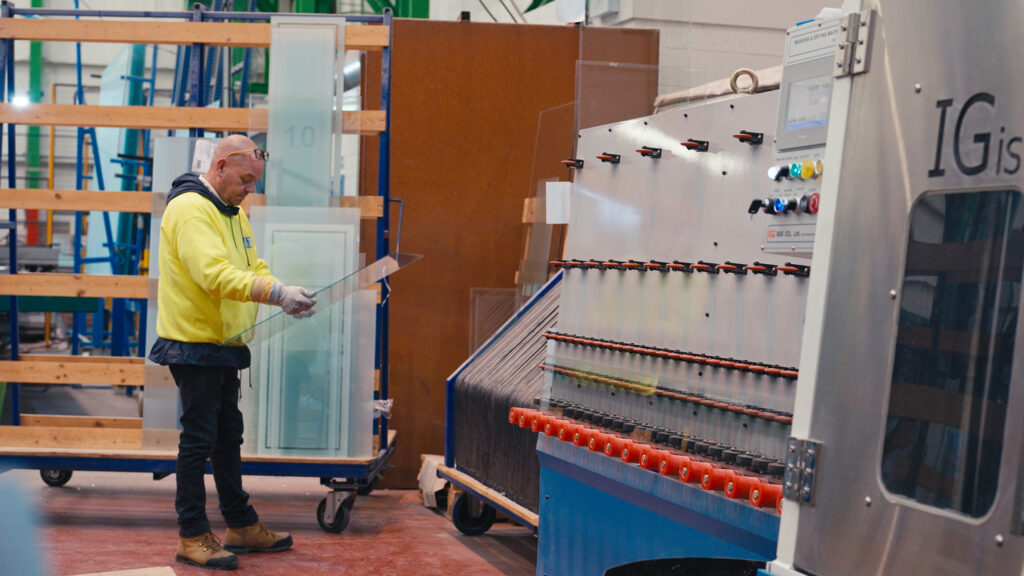
Ever wondered why the edges of high quality glass feel smooth and refined instead of dangerously sharp? That’s thanks to arrissing, a crucial but often overlooked step in the glass manufacturing process.
While cutting glass to precise dimensions is essential, the sharp edges left behind can lead to breakages, injuries, and processing issues if left untreated. This is where arrissing comes in—it helps smooth and reinforce the edges, making the glass safer, stronger, and more durable.
For glaziers, builders, and window manufacturers, understanding the importance of arrissing ensures better handling, improved safety, and reduced production waste. In this blog, we explain what arrissing is, why it matters, and how Glasscraft’s advanced process ensures superior glass quality for trade professionals.
Arrissing is the process of lightly grinding the sharp edges of cut glass to:
Reduce the risk of breakage during handling and installation.
Improve safety for installers, manufacturers, and end-users.
Enhance the glass’s ability to withstand stress and impact.
When glass is cut to size, the edges remain sharp and fragile, making them prone to chipping and cracking. By carefully removing the sharp edges and micro-fractures, arrissing helps strengthen the glass, preparing it for further processing, transportation, or installation.
For professionals in the glazing, construction, and home improvement industries, arrissing offers significant benefits. Without this crucial step, raw cut glass edges can cause serious handling risks and processing challenges.
1. Preventing Injuries from Sharp Edges
Handling unprocessed glass is hazardous due to its razor sharp edges. Arrissing smooths out these edges, significantly reducing the risk of cuts and injuries for installers, manufacturers, and end users.
2. Minimising Breakage & Reducing Production Waste
Glass edges are naturally weak points—tiny imperfections or micro-cracks can grow under stress, leading to unexpected breakages. By reinforcing these edges through arrissing, manufacturers can reduce production waste and improve overall glass durability.
3. Ensuring Compliance with Safety Standards
Many safety regulations require glass to be processed and handled in a way that minimizes risks. Arrissing helps trade professionals meet industry standards, particularly for double glazing, toughened glass, and laminated glass applications.
Without arrissing, improperly processed glass is more likely to fail during installation, transportation, or thermal toughening.
At Glasscraft, we use high-precision edge grinding machines to ensure that every piece of glass is processed to the highest standard. Our state-of-the-art arrissing process includes:
1. Precision Edge Grinding to Remove Micro-Fractures
Tiny micro-fractures can weaken glass over time. Our advanced grinding technology eliminates these imperfections, making the glass stronger and more resilient.
2. Creating Smooth Edges Without Weakening the Glass
Unlike traditional hand-grinding, our automated arrissing machines provide consistent, uniform edge processing, ensuring smooth but structurally sound edges.
3. Preparing Glass for Further Processing
Arrissing is a critical pre-treatment before additional processes such as:
Toughening (Tempering) – Prevents weak points that could cause the glass to shatter unevenly.
Laminating – Ensures better adhesion for laminated glass.
Sealing in Double Glazing Units – Eliminates potential flaws that could lead to IGU failure.
By perfecting our arrissing process, we ensure that every glass product meets the strictest safety and quality standards.
For builders, glaziers, composite door manufacturers, and home improvement specialists, sourcing glass that has undergone proper arrissing means:
Safer Handling & Installation – No sharp edges means fewer injuries and a smoother installation process.
Reduced Waste & Breakage – Lower risk of cracked or damaged glass during production and transportation.
Enhanced Product Durability – Longer lasting, stronger glass that meets safety requirements.
Skipping arrissing may save a small step in production, but the risks—increased breakages, installation difficulties, and customer complaints—far outweigh any cost savings.
While arrissing may seem like a minor step in glass production, it plays a huge role in ensuring safety, durability, and quality. This hidden process strengthens glass edges, prevents breakages, and makes handling safer for trade professionals.
At Glasscraft, we take arrissing seriously, ensuring every piece of glass is expertly processed for maximum strength and reliability. Whether you need double glazing, toughened glass, or composite door glass, our precisely arrissed glass provides exceptional quality and safety.
Contact Glasscraft today to learn more about our expert glass processing solutions and how we can support your business!
Modern life can be noisy. Whether it’s the steady hum of traffic, aircraft overhead, or a neighbour’s Saturday night playlist, unwanted sound has a way of finding its way indoors. The solution? Hytherm Silence, Glasscraft’s pre-specified acoustic glazing that delivers a quieter, calmer home environment, without compromising on light, safety or style. How Acoustic Glass […]

Choosing the right glazing isn’t just about how it looks, it’s about how it performs all year round. That’s why Cool-Lite SKN 176 is a popular specification for architects, contractors, and homeowners who need a balance of solar control, thermal insulation, and natural light. At Glasscraft, we use Cool-Lite SKN 176 in our Hytherm Solar […]

Glasscraft is delighted to announce the appointment of Steve Sunley as our new Area Sales Manager, covering the North of England. Steve brings with him a wealth of experience, having previously been a Company Director at Northeast Panels. His knowledge of the industry is backed by more than 15 years of professional connections. In his […]

We’re delighted to welcome Ellie O’Donoghue to the team as Customer Services Manager here at Glasscraft. Before joining us, Ellie worked as a manager in a community care company, leading a team of over 100 staff and supporting 250 vulnerable adults in their own homes. It was a role she loved, but when the opportunity […]

We’re excited to let you know that we now stock the MIRALITE® EASYSAFE safety mirror, a next generation product from Saint-Gobain Glass that’s a real industry innovation. Why are we bringing this to Glasscraft customers? Quite simply, it’s safer, smarter and easier to work with than a standard mirror. The factory applied resin backing holds […]
